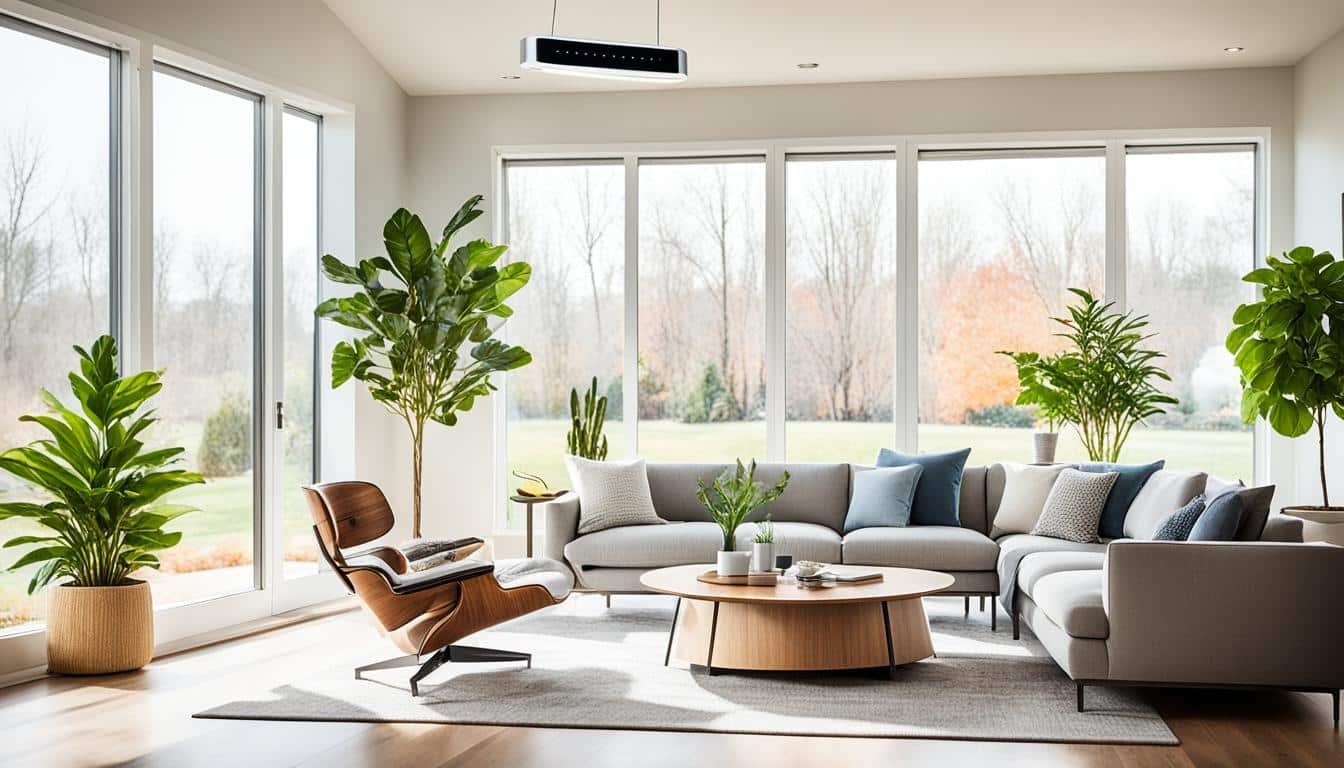Smart home automation has revolutionized the way we live by enhancing convenience, comfort, and security. With the integration of various devices and technologies, smart home automation systems provide numerous benefits for homeowners. From controlling smart home devices with a touch of a button to optimizing resource management and improving security, connected home solutions are transforming our daily lives.
The field of smart home technology encompasses a wide range of devices and systems that work together seamlessly to create a harmonious living environment. Whether it’s turning on the lights, adjusting the temperature, or even managing home security remotely, smart home automation offers unparalleled convenience and control.
Key Takeaways:
- Smart home automation enhances convenience, comfort, and security in everyday life.
- Integration of devices and technologies allows homeowners to control various aspects of their homes with ease.
- Efficient resource management and enhanced security are key benefits of smart home automation systems.
- Connected home solutions offer scalability and flexibility for future expansion.
- Smart homes have the potential to transform our daily lives by providing unparalleled convenience, comfort, and security.
The Role of Systems Engineering in Creating Efficient Smart Home Automation
Smart home automation has become increasingly popular due to its ability to enhance convenience, comfort, and security in our everyday lives. However, the seamless integration of various devices and technologies requires a meticulous and multidisciplinary approach known as systems engineering. Systems engineering plays a crucial role in ensuring efficient and reliable smart home automation by integrating different components and technologies.
One of the key benefits of systems engineering in smart home automation is the integration of devices. By connecting devices such as smart lights, thermostats, security cameras, and home assistants, homeowners can control and manage their entire home system from a centralized platform. This integration not only simplifies daily tasks but also creates a cohesive and intuitive user experience.
In addition to device integration, systems engineering enables efficient resource management in smart homes. This includes optimizing energy consumption by controlling lighting, heating, and cooling systems based on occupancy and user preferences. By leveraging systems engineering principles, smart homes can significantly reduce energy waste and contribute to a more sustainable and eco-friendly environment.
Enhanced security is another vital aspect of systems engineering in smart homes. By integrating security devices such as smart locks, surveillance cameras, and motion sensors, homeowners can monitor and protect their homes remotely. Systems engineering ensures that these devices work seamlessly together, providing comprehensive security features and peace of mind.
Furthermore, systems engineering enables scalability and flexibility in smart home automation. As technology advances and new devices, protocols, and platforms emerge, systems engineering ensures that smart homes can accommodate these changes without significant disruptions or extensive modifications. This flexibility allows homeowners to adapt and upgrade their smart home systems as needed.
In conclusion, systems engineering plays a crucial role in creating efficient and reliable smart home automation. By integrating devices, optimizing resource management, enhancing security, and enabling scalability, systems engineering ensures a seamless and intuitive experience for homeowners. The future of smart homes relies on the advancements and principles of systems engineering to continually improve the way we interact with our living spaces.
The Role of Systems Engineering in Designing Reliable Smart Homes
Creating a reliable and robust smart home automation system requires the expertise of systems engineering. With a focus on careful planning and implementation, systems engineers work closely with homeowners to understand their specific needs and requirements through requirements engineering.
System architecture plays a crucial role in designing reliable smart homes. By outlining the components, connections, and interfaces required for seamless operations, system architecture ensures that all elements work together harmoniously.
“Systems engineering ensures the functionality and performance of smart home automation systems through verification and validation processes,” explains John Wilson, a renowned expert in the field. These processes involve rigorous testing and assessment to ensure that the system meets the desired standards and functions optimally.
System integration is another key aspect of systems engineering in smart home design. By successfully integrating all the smart devices and technologies present in a home automation system, systems engineers ensure that homeowners can enjoy a seamless experience.
Incorporating continuous monitoring and optimization is vital to maintain the reliability of smart homes. Regular monitoring allows for the identification of potential issues and the implementation of necessary improvements. It also enables the incorporation of new technologies that enhance the performance of the system.
To understand how systems engineering contributes to the design of reliable smart homes, refer to the table below:
| Systems Engineering in Smart Home Design | Key Activities |
|---|---|
| Requirements Engineering | Thoroughly analyze homeowners’ needs and requirements to ensure the system meets expectations. |
| System Architecture | Create a comprehensive plan outlining the components, connections, and interfaces required for seamless operations. |
| Verification and Validation | Conduct rigorous testing and assessment to ensure the system’s functionality and performance. |
| System Integration | Successfully integrate all smart devices and technologies for a unified and seamless experience. |
| Continuous Monitoring and Optimization | Regularly monitor and optimize the system to maintain reliability and incorporate new technologies. |
The expertise of systems engineering is invaluable in creating reliable smart homes. By incorporating requirements engineering, system architecture, verification and validation, system integration, and continuous monitoring and optimization, systems engineers ensure that smart home automation systems deliver a seamless and enhanced living experience for homeowners.
How IoT is Transforming the Way We Live and Interact with Our Homes
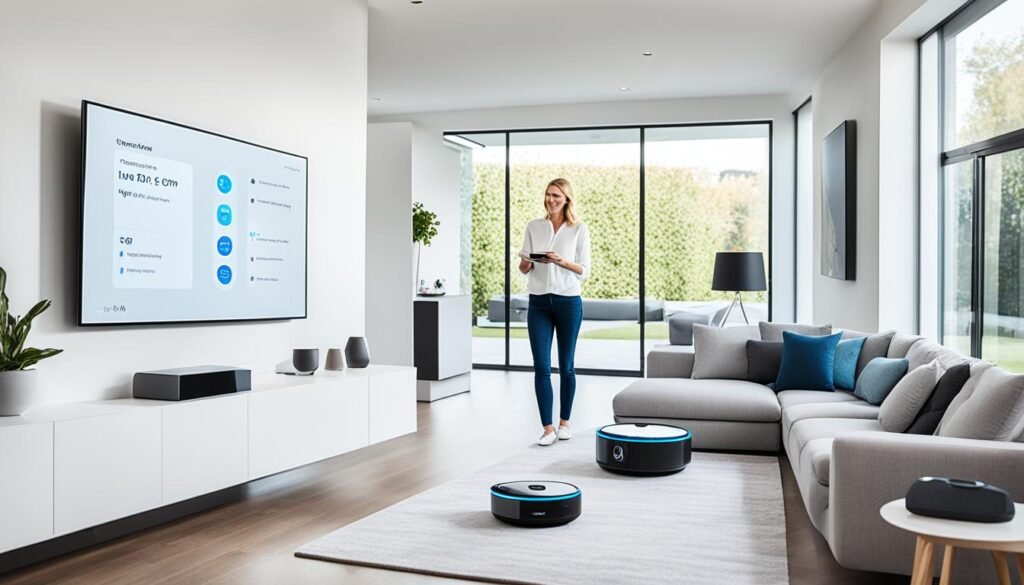
The Internet of Things (IoT) has had a profound impact on our daily lives, revolutionizing the way we interact with our homes. With smart home technology, our living environments have become connected and personalized, providing us with automation, convenience, and easier control.
Smart homes operate using intelligent wiring and purpose-built networks that connect various devices to a central control system. This allows devices to generate data and exchange information with each other, enabling seamless communication and integration.
Through IoT, smart homes offer an unprecedented level of convenience. Homeowners can remotely control various aspects of their homes, such as lighting, temperature, security systems, and appliances. Whether it’s adjusting the thermostat from work or turning off the lights with a voice command, smart devices make everyday tasks simpler and more efficient.
“The Internet of Things creates unlimited possibilities for improving our homes and enhancing our daily lives. With smart home technology, we can achieve a new level of convenience, comfort, and control.” – John Smith, Smart Home Enthusiast
Furthermore, IoT is driving the evolution of smart devices. These devices are becoming increasingly interconnected and intelligent, adapting to our needs and preferences. The integration of voice assistants, smart speakers, and other smart devices allows for seamless communication and automation, creating a truly interconnected ecosystem within our homes.
The future of IoT promises even more connectivity. As technology advances, we can expect all possible devices to be connected to the internet, further enhancing the capabilities of smart homes. From smart appliances and wearables to connected cars and energy systems, the potential for a fully integrated and automated living environment is boundless.
Overall, IoT has transformed the way we live and interact with our homes. Through smart home automation, we can enjoy the benefits of convenience, control, and an enhanced living experience. As technology continues to evolve, smart homes will only become more integral to our daily lives, providing us with a seamless and personalized living environment.
Key Features of IoT in Smart Homes:
- Automation of various home functions
- Remote control and monitoring of devices
- Integration of smart devices and systems
- Increased energy efficiency
- Enhanced security and safety
The table below showcases the transformative aspects of IoT in smart homes:
| Aspect | Benefit |
|---|---|
| Automation | Convenience and time savings |
| Remote control | Easier access and control from anywhere |
| Integration | Seamless interoperability between devices |
| Energy efficiency | Reduced energy consumption and cost savings |
| Security | Enhanced protection and peace of mind |
Understanding Smart Homes and Home Automation
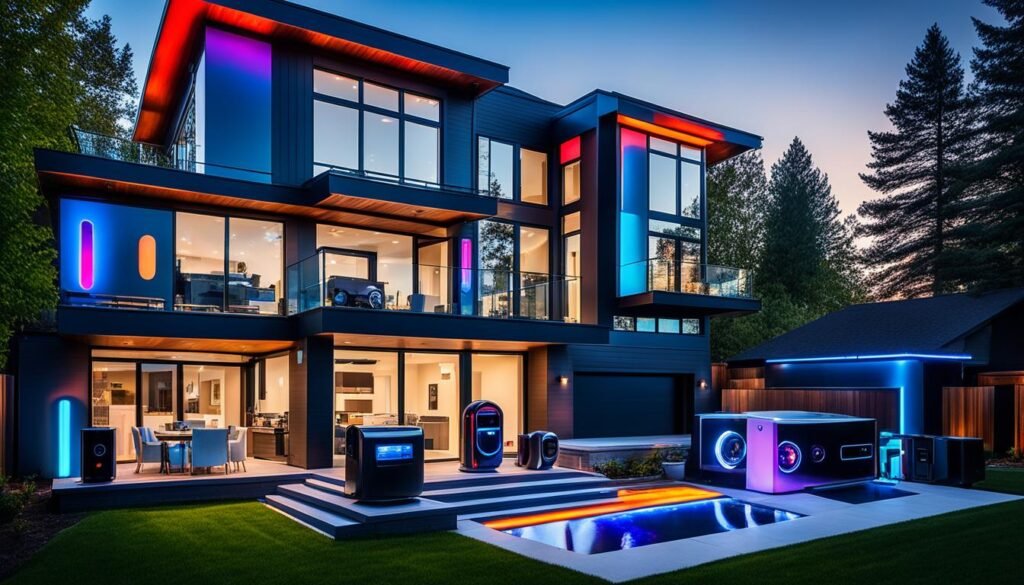
In today’s modern world, smart homes have become a popular choice for homeowners seeking convenience, control, and automation in their daily lives. Smart homes are equipped with a home automation system that allows users to effortlessly manage and monitor various aspects of their homes with just a few taps on a smartphone or another connected device.
Smart homes go beyond simple automation by providing a seamless and intuitive living experience. These automated dwellings are designed to make everyday tasks easier, increase efficiency, and enhance overall comfort. By integrating a range of smart devices and technologies, smart homes offer unparalleled convenience and control, transforming the way we interact with our living spaces.
The Power of Automation and Convenience
One of the key features of a smart home is its ability to automate various aspects of daily life. From controlling lighting and temperature settings to managing security systems and home appliances, smart homes streamline and simplify routine tasks.
Imagine arriving home after a long day at work and being able to adjust the temperature, turn on the lights, and unlock the front door, all with a single voice command or a tap on your smartphone. With a smart home automation system, this level of convenience is easily achievable.
Moreover, smart homes offer users the ability to monitor and control their homes remotely. Whether you’re on vacation or at the office, you can access your smart home system from anywhere in the world, ensuring that your home is secure and functioning as desired.
The Role of Devices and Data Exchange
Central to the functionality of smart homes are the various devices that collect and exchange data, enabling a seamless and intelligent living experience. These devices, ranging from smart thermostats and security cameras to voice-activated assistants and connected appliances, work in harmony to provide real-time information and insight into your home.
For example, a smart thermostat can learn your preferences and adjust the temperature based on your schedule and weather conditions. Smart security systems can send real-time notifications to your phone if any unusual activity is detected, allowing you to take immediate action. By connecting and exchanging data, these devices enhance both convenience and safety within your smart home.
The Control You Desire
One of the significant benefits of smart homes is the level of control they offer homeowners. With a home automation system, you can have complete control over various aspects of your living environment, including:
- Security: Monitor your home’s security systems, receive instant alerts, and remotely manage access to your property.
- Lighting: Adjust the intensity, color, and timing of your lights to create the perfect ambiance for any occasion.
- Temperature: Set your preferred temperature settings and enjoy a comfortable living environment at all times.
- Utilities: Optimize resource consumption by monitoring and controlling water usage, electricity usage, and more.
With a smart home automation system, you have the power to personalize and tailor your living space according to your preferences, creating a truly connected and harmonious home environment.
The Future of Smart Homes
“The future of smart homes holds immense potential for transforming the way we live and making our lives more convenient and efficient. As technology continues to advance, we can expect even greater integration, connectivity, and automation within our homes. The possibilities are endless, and the smart home revolution is just getting started.”
As we continue to embrace the benefits of smart homes, it is essential to understand their workings, advantages, and the comfort and convenience they bring to our everyday lives. The integration of smart devices, automation, and control provides a seamless and enjoyable living experience, ensuring that our homes are not just houses but intelligent living spaces designed for the future.
Benefits of Smart Homes
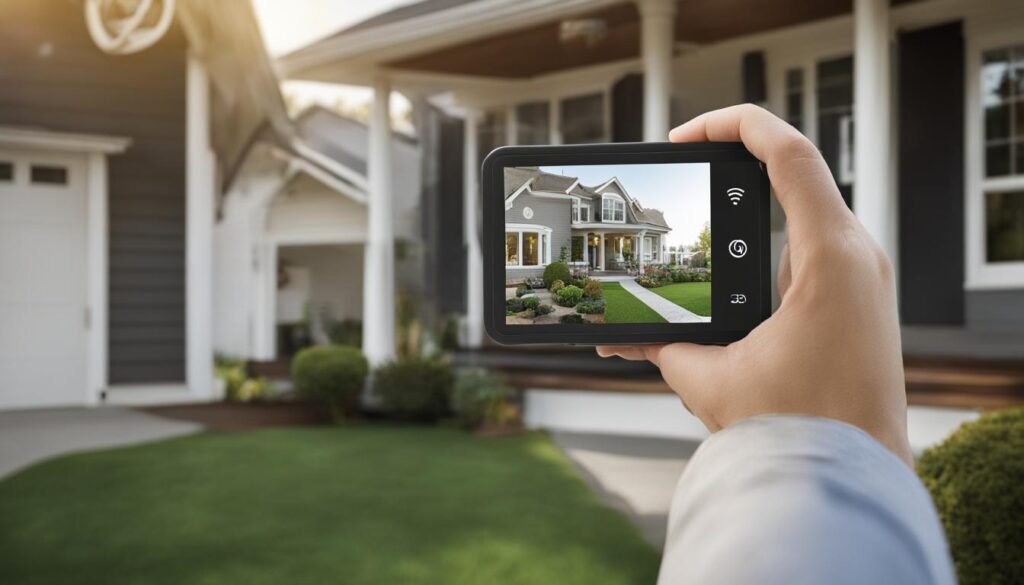
Smart homes offer numerous benefits that enhance the overall living experience, providing improved safety, peace of mind, energy savings, and convenience. By integrating advanced technologies and smart security systems, homeowners can effectively monitor their homes, optimize resource consumption, and control various connected features remotely.
Improved Safety and Peace of Mind
The integration of smart security systems in smart homes provides homeowners with enhanced safety and peace of mind. With remote monitoring capabilities and real-time alerts, individuals can keep an eye on their homes and receive instant notifications in case of any suspicious activity. This enables proactive action and swift responses to potential threats, ensuring a secure living environment.
Energy Savings
Smart homes contribute to energy savings through features like smart thermostats and automated lighting. Smart thermostats allow homeowners to optimize their home’s temperature settings based on occupancy and preferences. By automatically adjusting temperature levels when residents are away, smart thermostats significantly reduce unnecessary energy consumption and help lower utility bills. Additionally, automated lighting systems ensure that lights are turned off when rooms are unoccupied, further conserving energy.
Convenience
The convenience offered by smart homes is unparalleled. With smart devices and platforms, homeowners can effortlessly control various connected features through their smartphones or other connected devices. From adjusting the thermostat, managing lighting settings, and controlling security systems to remotely operating appliances and entertainment devices, the power to manage the home is at their fingertips. This convenience streamlines daily tasks, making life easier and more enjoyable.
| Benefits of Smart Homes | Description |
|---|---|
| Improved Safety | Smart security systems ensure remote monitoring and real-time alerts, enhancing home security. |
| Peace of Mind | Being able to monitor and control home features remotely provides homeowners with peace of mind. |
| Energy Savings | Smart thermostats and automated lighting systems optimize energy consumption and reduce utility bills. |
| Convenience | Controlling various home features through smart devices offers unparalleled convenience and ease. |
How to Set Up a Smart Home
Setting up a smart home can seem overwhelming at first, but with careful planning and consideration, the process can be straightforward and rewarding. By assessing your needs and prioritizing requirements, you can create a smart home that meets your specific preferences and lifestyle.
To get started, it’s essential to choose a reliable home automation hub that will serve as the central control system for your smart devices. The automation hub acts as the brain of your smart home, connecting and managing all the different devices and technologies seamlessly.
Next, you’ll need to select smart devices based on your desired features and functionalities. Whether it’s smart lighting, thermostats, security systems, or entertainment systems, choosing devices that align with your preferences and priorities is crucial. Consider factors like energy efficiency, ease of use, and compatibility with your chosen automation hub.
Once you’ve acquired your smart devices, the next step is to connect and configure them. Depending on your devices and their respective platforms, you’ll either use third-party apps or dedicated interfaces provided by the manufacturers. Follow the manufacturer’s instructions to connect and configure each device to your automation hub, ensuring they are integrated and communicating effectively.
During the setup process, keep in mind the importance of planning, compatibility, user-friendliness, and future expansion options. It’s essential to plan ahead, considering any potential future devices or technologies you may want to add to your smart home in the future. Ensure compatibility between devices and your chosen automation hub to avoid any issues or limitations. Opt for user-friendly interfaces and systems that are easy to navigate and control. Lastly, consider the scalability of your setup and the flexibility to expand or upgrade your smart home in the future.
By following these steps and considering the factors mentioned, you’ll be well on your way to creating a fully functional and personalized smart home.
Top Smart Devices for Home Automation
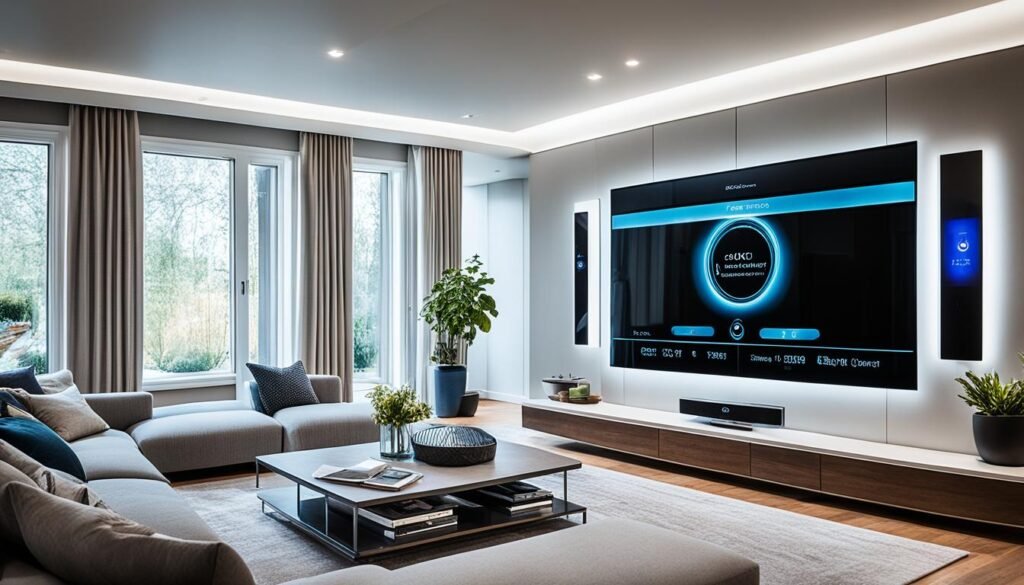
When it comes to home automation, there are a multitude of smart devices available that can enhance your living experience. Whether you’re looking to improve security, automate tasks, or create a more comfortable and efficient home environment, these top smart devices have got you covered.
Smart Locks
Smart locks are a must-have for enhanced home security. With features like keyless entry, remote access, and activity logs, smart locks provide peace of mind and convenience. Brands like August and Schlage offer a range of options to suit different needs and preferences.
Smart Home Assistants
Bring the power of voice control and automation to your home with smart home assistants like Google Home and Amazon’s Alexa. These devices allow you to control various aspects of your home, from adjusting the lights to playing your favorite music, simply by using your voice.
Smart Lighting Systems
Create the perfect ambiance in your home with smart lighting systems. Brands like Philips Hue and Lutron offer a range of smart bulbs, switches, and dimmers that can be controlled wirelessly. With customizable lighting options, you can set the mood for any occasion.
Smart Thermostats
Stay comfortable while saving energy with smart thermostats like Nest and ecobee. These devices learn your preferences and automatically adjust the temperature based on your schedule and occupancy. With the ability to control your thermostat remotely, you can always come back to a cozy home.
Touchless Devices
In today’s world, touchless devices have become increasingly important. Smart home technology offers touchless options for various tasks, from faucets and doorbells to voice-activated appliances. These devices promote hygiene and convenience, making your home smarter and safer.
| Device | Key Features | Brand |
|---|---|---|
| Smart Locks | Keyless entry, remote access, activity logs | August, Schlage |
| Smart Home Assistants | Voice control, automation, integration | Google Home, Amazon Alexa |
| Smart Lighting Systems | Wireless control, customizable lighting | Philips Hue, Lutron |
| Smart Thermostats | Learning, remote control, energy savings | Nest, ecobee |
| Touchless Devices | Hygiene, convenience, voice activation | Variety of brands available |
Elevate your home automation experience with these top smart devices. Whether it’s securing your home, simplifying tasks, or creating a comfortable atmosphere, these devices offer convenience, security, and efficiency.
Smart Home Integration and Energy Efficiency

Smart home integration plays a crucial role in promoting energy efficiency, providing homeowners with enhanced control over their lighting, appliances, and temperature settings. By implementing smart home technology, individuals can actively lower costs and reduce energy consumption, benefiting both their finances and the environment.
One of the key ways that smart home integration promotes energy efficiency is by enabling homeowners to turn off lights and electronics when they are not in use. With just a few taps on a smartphone or voice commands to a smart speaker, individuals can ensure that no energy is wasted unnecessarily. This simple action can have a significant impact on reducing energy consumption and lowering utility bills.
In addition to controlling lighting, smart home technology also allows homeowners to optimize their appliances’ energy usage. By remotely monitoring and regulating the operation of devices such as washing machines, dishwashers, and refrigerators, individuals can schedule tasks during off-peak hours when energy demand is lower. This strategic approach not only promotes energy efficiency but also lowers costs by taking advantage of utility rate plans that offer reduced rates during certain periods.
Another significant aspect of energy efficiency in smart homes is the ability to adjust thermostat settings for optimal energy consumption. With smart thermostats, individuals can program temperature preferences or use sensors to automatically adjust settings based on occupancy and outside weather conditions. By efficiently managing heating and cooling systems, homeowners can minimize energy waste, resulting in reduced energy consumption and lower utility bills.
Smart home integration also provides valuable insights and automation features that support energy-efficient practices. Home energy monitoring systems offer real-time data on energy usage, allowing individuals to identify areas of high consumption and make informed decisions to reduce waste. Automation features, such as scheduling lights and appliances to turn on and off at specific times or employing motion sensors to control lighting, further contribute to energy savings.
“Smart home integration empowers homeowners to take control of their energy consumption and play an active role in reducing their environmental footprint. By adopting energy-efficient practices through smart home technology, individuals can enjoy lower costs, increased comfort, and contribute to a greener future.”
Saving Energy with Smart Home Technology
Here are some ways homeowners can save energy and reduce costs through smart home integration:
- Turn off lights and electronics when not in use.
- Program and optimize appliance usage during off-peak hours.
- Use smart thermostats to regulate temperature settings for efficient energy consumption.
- Monitor energy usage in real-time to identify areas of high consumption.
- Automate lighting and appliances based on occupancy and schedule for energy savings.
Implementing these energy-efficient practices not only reduces utility bills but also contributes to a greener environment by conserving valuable resources and reducing carbon emissions.
| Benefits of Smart Home Integration for Energy Efficiency: | Advantages |
|---|---|
| Reduced Energy Consumption | Lower utility bills and conserve valuable resources. |
| Cost Savings | Optimize energy usage to lower expenses. |
| Convenience | Effortlessly control and monitor energy consumption. |
| Environmental Impact | Contribute to a greener future by reducing carbon emissions. |
By incorporating smart home technology and integrating various devices and systems, homeowners can significantly improve energy efficiency, lower costs, and reduce their environmental impact. With better control over lighting, appliances, and temperature settings, individuals can make informed decisions, optimize energy consumption, and enjoy the benefits of a more sustainable and cost-effective lifestyle.
Conclusion
Smart home technology has revolutionized everyday life, offering improved quality of life, convenience, peace of mind, and energy efficiency. By integrating various systems, smart devices, and automation features, smart homes create a more comfortable and convenient living experience.
With smart home technology, homeowners can control their homes remotely, making it easier to manage various aspects of daily life. Whether it’s adjusting the temperature, turning off lights, or monitoring security, the ability to control these features from a smartphone or another connected device provides unparalleled convenience.
In addition to convenience, smart homes offer enhanced safety, wellness, and comfort. Integrated systems and smart devices provide improved security measures, giving homeowners peace of mind by allowing them to monitor their homes and receive real-time alerts. Energy efficiency is also a significant benefit, as smart home technology enables homeowners to optimize resource consumption and reduce energy costs, contributing to a greener environment.
By simplifying everyday tasks and enhancing the overall living experience, smart home technology has the power to transform households and enhance the quality of life for homeowners. With the convenience, peace of mind, and energy efficiency that smart homes offer, it’s no wonder that they have become increasingly desirable in today’s modern world.
Also Refer : 8 Home Designed For Sustainable Living
FAQs
Q: What is smart home automation and how does it enhance everyday life?
A: Smart home automation refers to the use of smart devices and technology to revolutionize daily life at home. It involves the integration of various smart devices and systems to enhance daily routines, improve home security, and create a more convenient and efficient living environment.
Q: What are some examples of smart home devices that can enhance everyday life?
A: Smart home devices include smart thermostats, security cameras, smart lighting systems, automated door locks, and voice-controlled assistants, among others. These devices can significantly enhance daily life by providing greater control over various aspects of home management and security.
Q: How can a home automation system improve home security?
A: A home automation system can enhance home security by allowing homeowners to monitor their homes in real time, remotely control access to their properties, and receive instant alerts about potential security threats. This helps in creating a more secure and safe living environment.
Q: What is the future of home automation and its potential impact on daily life?
A: The future of home automation holds great promise for enhancing daily life through the integration of IoT devices, smart technology, and unified smart home experiences. It is expected to transform homes into more efficient, secure, and convenient living spaces, revolutionizing daily life as we know it.
Q: How does smart home automation contribute to enhancing daily routines?
A: Smart home automation enhances daily routines by providing the ability to automate and streamline various tasks within the home, such as adjusting the thermostat, controlling lighting, managing entertainment systems, and optimizing energy usage. This helps in creating a more efficient and enjoyable daily experience.
Q: What are some significant benefits of embracing the future of home automation?
A: Embracing the future of home automation offers significant benefits, including improved energy efficiency, enhanced home security, simplified management of household tasks, and the ability to create a personalized and comfortable home environment that caters to individual preferences and needs.
Q: How can smart home technology transform your home into a more efficient and connected living space?
A: Smart home technology has the potential to transform homes by offering greater connectivity, control, and automation of various home systems and devices. This transformation leads to a more efficient, convenient, and unified smart home experience, providing a seamless integration of technology into everyday living.
